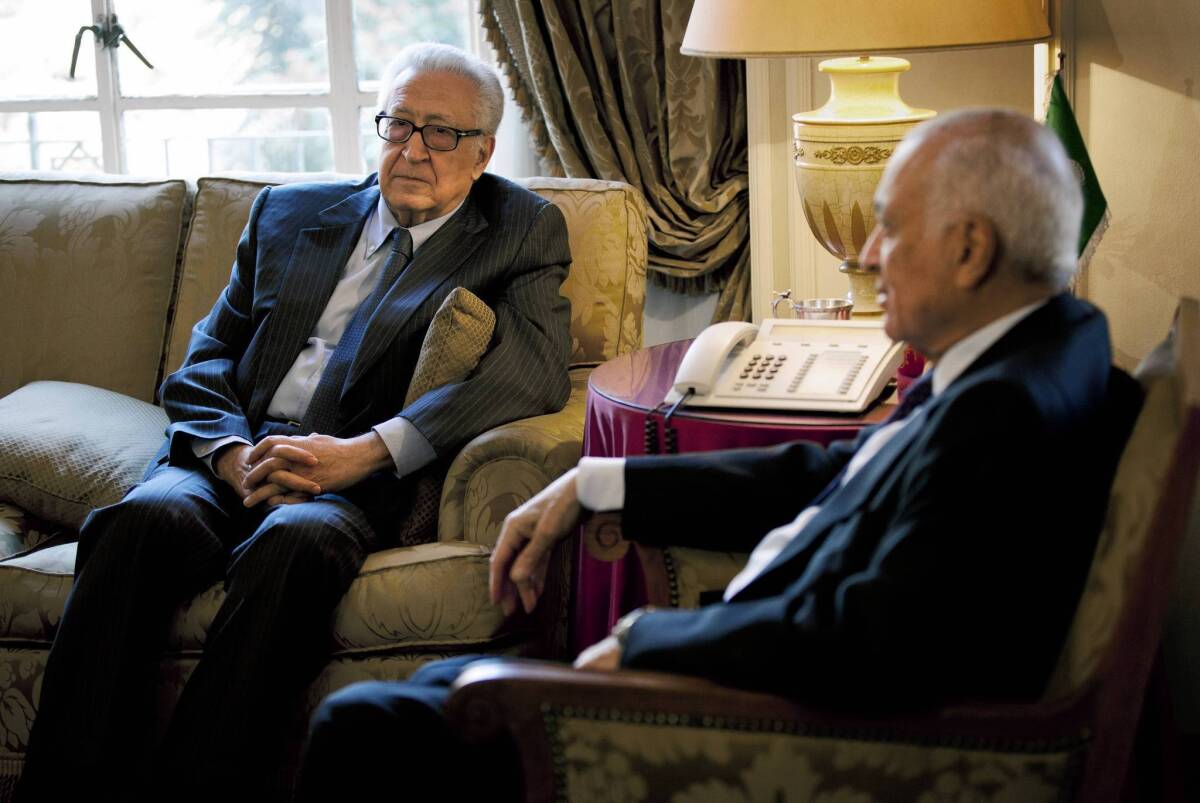Peace envoy Lakhdar Brahimi calls for fresh talks on Syria

- Share via
BEIRUT — The United Nations-backed peace envoy called Sunday for talks in a fresh bid to end Syria’s bloodshed, but deep distrust between both sides in the conflict casts doubt on the likelihood of meaningful dialogue.
Negotiations between the Syrian opposition and an “acceptable delegation” from the government of President Bashar Assad “will be a beginning to exit the dark tunnel which Syria has entered,” said Lakhdar Brahimi, special peace envoy for the U.N. and the Arab League.
Speaking in Cairo, Brahimi said talks could commence at an unspecified U.N. site. But there is no date set for negotiations and no clear idea of who would be deemed “acceptable” participants.
Moreover, the central issue — the fate of Assad’s government — remains in dispute, and neither side seems inclined to budge.
The opposition insists any talks must result in the removal of Assad and his security leadership. The government rejects any such “precondition,” but has itself seemed to rule out talks with armed opponents it dubs “terrorists,” and with exile leaders labeled “puppets” of the West.
To date, each side seems to view negotiations as an alternate route to victory, rather than as a compromise-laden path to peace and reconstruction in a nation devastated by almost two years of conflict.
“Both the opposition and the regime remain determined to defeat the enemy,” noted Peter Harling, Middle East project director with the International Crisis Group, a think tank that works on conflict resolution. “They are beginning to wage this struggle somewhat more politically, rather than through escalation solely.”
Still, the urgent push for peace talks — a goal now nominally supported by both warring parties and their respective external allies — highlights how the Syria debate has shifted. There now seems to be an explicit mutual recognition that neither the opposition nor Assad’s government can score a military victory, at least not any time soon.
Recent rebel advances still show no definitive sign of dislodging the strategic stalemate that has taken hold in major battle fronts, notably Aleppo and Damascus, Syria’s two principal cities.
As recently as November, when the current opposition coalition was formed in Qatar with prodding from Washington and its allies, rebels voiced the hope that they might finally acquire the kind of heavy weaponry and possibly even air support that could help overcome the military’s superior firepower. Today, anti-Assad combatants in the field seem to have all but given up hope of such foreign assistance.
Meanwhile, the rise of Islamic militants and flow of international Islamic militants into the rebel ranks have clearly alarmed the Obama administration. The prospect of advanced weaponry falling into the hands of Al Qaeda-linked and other militants has added a troubling new dimension to the crisis.
Israel’s Jan. 30 airstrike near Damascus — Syria called the target a scientific research center — highlighted concerns that Syrian arms could be headed to Hezbollah forces in neighboring Lebanon.
Last week, new Secretary of State John F. Kerry warned against “the implosion of the state” in Syria, saying it raised “the possibility of the worst kind of outcomes.” Still, Kerry pointed to the “inevitability” of Assad’s downfall, saying he planned to work with Russia, Syria’s major foreign ally, to change the Syrian president’s “calculation.”
Moscow has welcomed the prospects of negotiations, but has so far remained steadfast in refusing to help push aside Assad, its longtime ally.
In Damascus, the government seems to see its adversary’s abrupt embrace of talks as a sign of weakness in the fractious opposition alliance. Much of the opposition had long insisted that Assad step down before talks could begin. It was only last month when Moaz Khatib, who heads the main anti-Assad coalition, first broached the idea of talks with the government. But Khatib has since said the talks must lead to Assad’s departure.
“They want dialogue tailored to their conditions,” the state-run news agency said Sunday, paraphrasing an interview with Syrian Information Minister Omran Zoubi.
Not long ago, some were predicting Assad’s imminent downfall. Many in the West labeled as delusional Assad’s defiant Jan. 6 speech lashing out at his enemies and calling for dialogue while he called the shots. These days, however, a more measured calculation about Assad’s hold on office seems to prevail.
“You cannot put a timeline on staying power, on how long he is staying, when he will leave,” Jordanian Foreign Minister Nasser Judeh said in Washington last week. “I think we put all that aside and we say that there’s a conviction all around that it is a political solution that needs to kick in and the current situation is untenable.”
Special correspondent Nabih Bulos contributed to this report.
More to Read
Sign up for Essential California
The most important California stories and recommendations in your inbox every morning.
You may occasionally receive promotional content from the Los Angeles Times.













